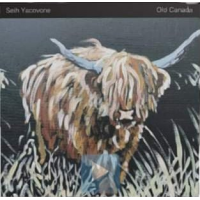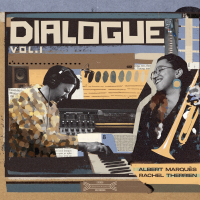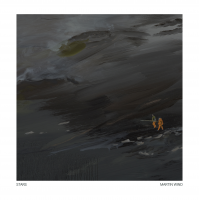Home » Jazz Articles » Album Review » Maleem Mahmoud Ghania & Pharoah Sanders: The Trance Of S...
Maleem Mahmoud Ghania & Pharoah Sanders: The Trance Of Seven Colors
Pharoah Sanders is a case in point. His two Laswell-produced albums for Verve, Message From Home (1995) and Save Our Children (1998), verge on the parodic. The first revisits Sanders' greatest moments from his late 1960s and early 1970s Impulse albums, fresh wrapped for Balearic rave audiences. The flowing, lyrical character of the original albums is replaced by a mechanistic beat and off-the-shelf licks from Laswell's first-call organist, Bernie Worrell, and kora player Foday Musa Suso. Save Our Children is less clichéd and includes a gorgeous reading of Manning Sherwin's "A Nightingale Sang In Berkeley Square," a tune which Sanders was still including in his live set when this writer last saw him, in late 2017. But, as a whole, the album comes across as Laswell's rather than Sanders' vision.
Laswell and Sanders' collaborations were not always thus, however. They began with the outstanding, little known and 360° authentic The Trance Of Seven Colors. The album was originally released by Laswell in 1994 on CD and cassette on his own Axiom label. The CD has never been reissued, but a bootleg cassette was released by Loathed Sounds in 2017, when Laswell also self-released various digital formats.
The Trance Of Seven Colors was recorded live in the courtyard of a private house in the medina in Essaouira, Morocco. It features Sanders alongside the late guimbri player Maleem Mahmoud Ghania, a leading light of gnawa, a percussive, black African trance music originally heard only in southern Morocco. Laswell's production is formula-free and there appear to be no overdubs, no post-production sonic manipulations and only a little editing. It is a field recording, pure and simple and, apart from a couple of occasions when Sanders veers off-mic, it is well recorded.
Sanders is heard on six of the nine tracks with Ghania and his percussion and vocal ensemble, on one track with ghaita players Abdelmalak Ben Hamou and Maleem Abdelkabir Addabachi, and sits out the rest. Most of the tunes are traditional gnawa numbers; two, including the elegiac ballad "Peace In Essaouira," which is dedicated to Sonny Sharrock, who had passed a week earlier, are Sanders originals.
By 1994, Sanders was almost three decades into the lyrical, mellifluous style of astral jazz which he had introduced on Tauhid (Impulse, 1967), and which had replaced the ferocious, paint-stripping aesthetic with which he had launched his recording career on Pharoah (ESP, 1965) and had maintained during his time with John Coltrane during Coltrane's final years.
On The Trance Of Seven Colors, however, driven by gnawa's relentless rhythm and sandpaper sonics, and most particularly perhaps by the raw reediness of the ghaitas, Sanders frequently scrolls back to the ESP/Coltrane paradigm, which was packed with high harmonics, split tones and low register honks. It was to be a temporary rewind, as evidenced by 1999's gorgeously balladic Crescent With Love (Venus Records), and is all the more precious for it. There are two sides to Sanders and both are to be treasured.
Track Listing
La Allah Dayim Moulenah; Bala Moussaka; Hamdouchi; Peace In Essaouira (For Sonny Sharrock); Boulandi Samawi; Moussa Berkiyo; Salat Anbi; Casa Casa Atougra; Mahraba.
Personnel
Pharoah Sanders: tenor saxophone; Maleem Mahmoud Ghania: guimbri, vocals, tambourine; Abdelmoula Hnikkich, Mustapha Bousan, Mizmar: harraz drum; Abdelmalak Ben Hamou, Maleem Abdelkabir Addabachi: ghaita; Abderrahman Nimini: tambourine; Maleem Boubker Ghania: guimbri; Maleem Mahmoud Ahkaraz: tambourine; Abdellah Ahkaraz, Abdellatif Abdellaoui, El Moktar Ghania, Hassan Machoure, Maleem Abdellah Ghania, Mohamed Abdellaoui, Mohamed Boujmia, Mohamed Outanine: karkaba clappers, handclaps, male chorus; Zaida Ghania: leader female chorus; Mina Ahkaraz, Saida Battach, Fatna Ifis, Fatima Labied, Hafida Ghania, J’mia Ghania, Khadija Ghania, Malika Ghania: female chorus.
Album information
Title: The Trance Of Seven Colors | Year Released: 2017 | Record Label: Axiom
Tags
PREVIOUS / NEXT
Support All About Jazz
 All About Jazz has been a pillar of jazz since 1995, championing it as an art form and, more importantly, supporting the musicians who make it. Our enduring commitment has made "AAJ" one of the most culturally important websites of its kind, read by hundreds of thousands of fans, musicians and industry figures every month.
All About Jazz has been a pillar of jazz since 1995, championing it as an art form and, more importantly, supporting the musicians who make it. Our enduring commitment has made "AAJ" one of the most culturally important websites of its kind, read by hundreds of thousands of fans, musicians and industry figures every month.





















